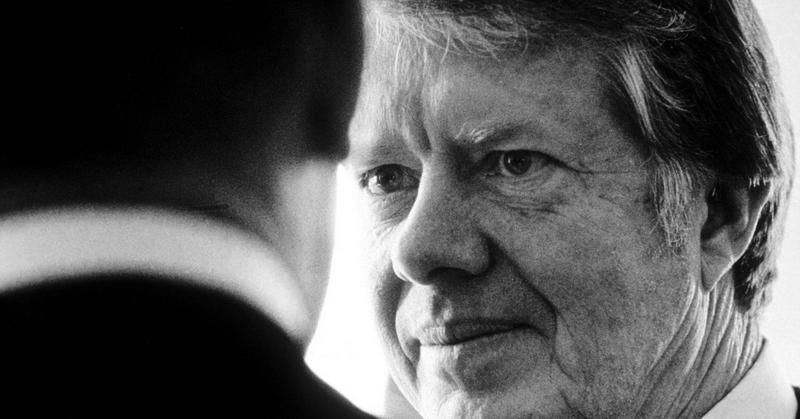1977: Jimmy Carter Pardons Draft Dodgers On Day One (But Reinstates Registration)
By | January 18, 2020

Draft-dodging was a hot issue during the Vietnam War; but what happens when the war is over? Is it ok for a president -- say, Jimmy Carter -- to pardon those who avoided serving in a war that the country had come to regret?
The U.S. military is made up of men and women who volunteer to serve the country in times of both peace and war, but until 1973 young men between the ages of 18 and 25 were a part of the draft, a lottery system that determined who served in the military and who stayed home. Most notably this system was in effect during the Vietnam War. The only way to avoid the fight was to evade the draft in one way or another. Some people fled to Canada, others went overseas, and some did their best to hide in plain sight in America. Whatever the case, they were considered criminals. When Jimmy Carter was elected President he pardoned everyone who escaped the draft, but he also created mandatory registration in case of another draft. Carter was trying to make everyone happy, and while he succeeding in some ways, he was managed to create an issue that we still argue about today.
The pardon effected thousands of people

It’s not easy to say exactly how many people resisted the draft, but it’s believed that around 500,000 young Americans avoided the draft by leaving the country in the 1960s and early ‘70s. Most of these people went to Canada, where they were protected as immigrants while about 10 perfect of escapees went to various places overseas where government agencies weren’t asking a lot of questions. Overnight these resistors became fugitives who could never return to their home country. They bid their families adieu, and accepted the fate that they couldn’t even travel through the United States without risk of arrest.
Nearly half of all draft dodgers were prosecuted

Before Carter entered office the U.S. government was spending a lot of money to prosecute draft evaders even after the end of the Vietnam War. In total, 209,517 men were charged with violating the draft while something like 360,000 other resistors went without a formal charge. With nearly half of the dodgers facing jail time it’s clear that the U.S. government was serious about throwing the book at these guys. Anyone who tried to enter the United States after dodging the draft would be prosecuted.
During his 1976 campaign Jimmy Carter said that he wanted to change that. One of his main promises was that he planned on pardoning any draft dodgers in order to put the Vietnam War in the past and move on.
Carter actually did it

Aside from placing his hand on a Bible and taking a tour of his new office the first thing that Carter did when he got into the White House was issue a pardon of everyone who fled the United States to avoid serving in the Vietnam War. As radical as this was, Carter, a Democrat, was continuing in the path of his Republican predecessor Gerald Ford, who had issued conditional amnesty to those who evaded the draft.
Even though this was a huge win for people who wanted to return to America, the pardon wasn’t extended to every person who avoided the fight in Vietnam. Deserters were ineligible for a pardon and any soldier who was removed from the military with a dishonorable discharge held onto their marred record.
Not everyone was happy with this decision

Carter’s decision to pardon draft dodgers caused a major partisan ripple in the United States. Some people were so angry at Carter that they complained to the White House every day for months, while others were just happy that their sons could return home. Senator Barry Goldwater called the decision, “the most disgraceful thing a president has ever done.”
The pardon was even controversial among amnesty groups who felt that Carter wasn’t lenient enough and that he should have included deserters in his declaration. On top of that, by making another law that forced young men to sign up for selective service some people in favor of the pardon felt that Carter was talking out of both sides of his mouth. While those who escaped the Vietnam War were now free to travel back to America what would happen to the men who refused to serve the next time the draft was called? Luckily we’ve never had to find out.
Not every draft resistor returned to the States

Once the pardon was in full effect everyone who avoided the draft was free to move freely about the country without free of arrest most of the men who fled to Canada stayed there. It’s believed that less than 50,000 people returned to America after being pardoned. The CBC writes that the draft dodgers who went to Canada found a work force that was accepting of their youth and intelligence and that it just made sense to stay north of the border. Most of the men who returned to America were those who weren’t able to stand out from the Canadian workforce in any significant way.
If nothing else, Carter’s contradictory laws made for a confusing time in North America. The repercussions of this pardon are still being felt today as many people on both sides of the aisle argue that Selective Service no longer makes sense (if it ever did), especially now that the military has opened up to include women and some members of the LGTBQIA community.
